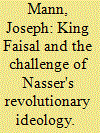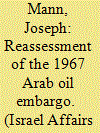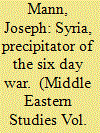|
|
|
Sort Order |
|
|
|
Items / Page
|
|
|
|
|
|
|
| Srl | Item |
| 1 |
ID:
077253


|
|
|
| 2 |
ID:
114870


|
|
|
|
|
| Publication |
2012.
|
| Summary/Abstract |
The purpose of this article is to examine the relations between Egypt and Saudi Arabia from the time of King Faisal's rise to power until President Nasser's death, via various events that shaped the Middle East. The article will also examine the main points of disagreement between the two countries, as well as the threat to the stability of the Saudi regime posed by the Egyptian President during those years. Finally, the research will examine the influence of President Nasser's death on Saudi-Egyptian relations and on the Middle East in general.
|
|
|
|
|
|
|
|
|
|
|
|
|
|
|
|
| 3 |
ID:
126729


|
|
|
|
|
| Publication |
2013.
|
| Summary/Abstract |
The 1967 war had more influence on the Arab-Israeli conflict than any other factor, and yet the Arab states did not make use of their most efficient weapon. Most of the research on the Six Day War which has touched on the oil embargo blames the embargo's failure on the lack of Arab unity rather than on the inability to set oil policies. Indeed, many researchers believe that the disagreements within the Arab world before the war prevented the oil-producing states from cooperating with their counterparts, such Egypt and Syria, that took part in the war against Israel, and that the embargo therefore did not stand a chance of succeeding. This article seeks to refute the received wisdom that the 1967 oil embargo was a failure because of the lack of Arab unity. By contrast, the success of the 1973 oil embargo was not, as is widely argued, due to Arab unity but to the nature of the oil market at the time.
|
|
|
|
|
|
|
|
|
|
|
|
|
|
|
|
| 4 |
ID:
092505


|
|
|
|
|
| Publication |
2009.
|
| Summary/Abstract |
Russia and OPEC are major oil producers. Considering the growing energy demand for the global economy, both parties are consistently increasing their exports of hydrocarbons and developing new supply capacities. Meanwhile, both parties have a mutual interest in creating a stable market by cooperating. However, the likelihood of Russian cooperation with OPEC is largely a function of oil prices and the political relations between Russia and OPEC countries. The following article deals with the relations between Russia and OPEC since the collapse of the USSR to the economic crisis in 2008. The author examines the political, cultural and economic conflicts between the two parties and their different attitudes toward the oil market in order to assess their chance to fully cooperate in the long term.
|
|
|
|
|
|
|
|
|
|
|
|
|
|
|
|
| 5 |
ID:
133545


|
|
|
|
|
| Publication |
2014.
|
| Summary/Abstract |
The Black September events in Jordan in 1970 are an example of the conflict the Palestinian issue presented for monarchic regimes. On the one hand, wealthy regimes such as Saudi Arabia and Kuwait wanted to assist the Palestinians in their struggle against Israel, but on the other hand, the moment they understood that siding with the Palestinians could weaken their regimes, they renounced their support. This article, therefore, emphasizes the importance the monarchic regimes in the Persian Gulf attributed to their own stability, and the influence that issue had on their policies within the Arab world.
|
|
|
|
|
|
|
|
|
|
|
|
|
|
|
|
| 6 |
ID:
122048


|
|
|
|
|
| Publication |
2013.
|
| Summary/Abstract |
The Six Day War is renowned for its impact on the shaping of the Middle East. In the last few decades, much research examining the reasons for the outbreak of the Six Day War, its development and its ramifications has been published. Most of the research has focused on an examination of Israeli government policy before and after the war, on the Egyptian regime's hatred of the 'Zionist entity' and on the involvement of the superpowers during and after the war. Some research has also touched on Syria's role in the outbreak of the war. Researchers such as Eyal Zisser and Moshe Maoz have shown Syria's decisive role in initiating the war and suggest that various factors, such as a lack of government stability in Syria, precipitated the conflict. This research continues, to a great extent, in the line of those researchers: indeed, it points to Syria as being the main factor behind the outbreak of war through an examination of the changes that occurred in the character of its government from 1966. However, unlike other research so far, this attempts to show that the unique character of the neo-Ba'ath regime is what brought war to the region and that, had the Ba'ath coup not occurred in 1966, it is doubtful whether Syria would have entered the conflict. This article seeks to emphasize that the Syrian regime went blindly into the war despite military unpreparedness and a lack of political and military cooperation with other Arab countries and with the Soviets. It also exposes, for the first time, the state of the Syrian troops on the front and in the cities, as well as the feelings of the senior officers on the eve of the war, and reveals documents about the military and political cooperation between Syria and Egypt that would eventually force President Nasser to enter a war he did not want to get involved in. Moreover, the research exposes the deep rift - which many believe pushed Syria to take rash independent measures -between the Soviet leadership and the Ba'ath regime before the war. And, finally, the research exposes the atmosphere in Syria following the war, and the administrative and military steps the Syrian regime took immediately after the defeat in order to consolidate its power.
|
|
|
|
|
|
|
|
|
|
|
|
|
|
|
|
| 7 |
ID:
073588


|
|
|
|
|
|
|
|